
What You Eat AffectsHow You Feel >>

You Deserve to FeelYour Best All Year Long>>

How to Talk the Talk>>
In the United States:

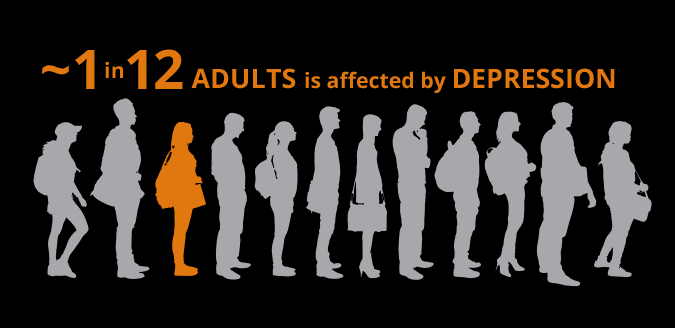
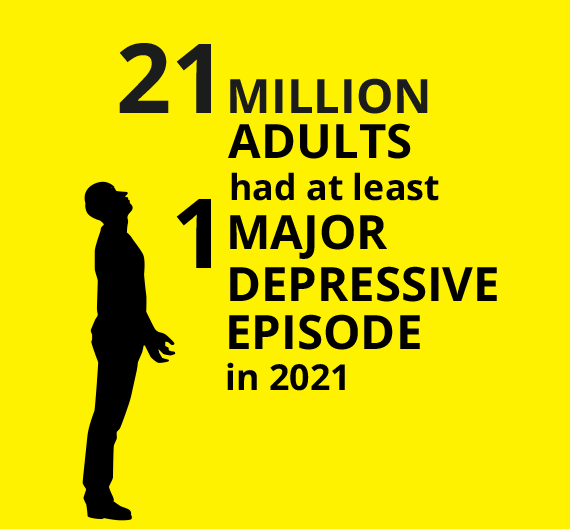
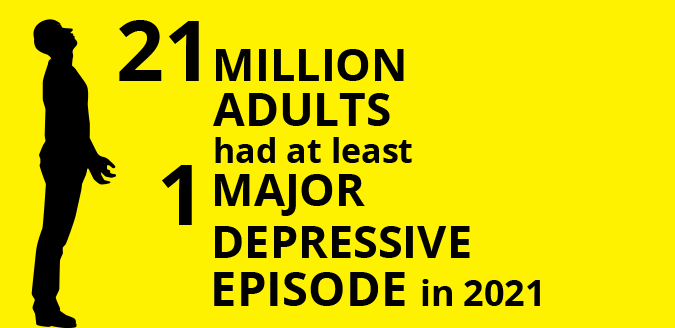
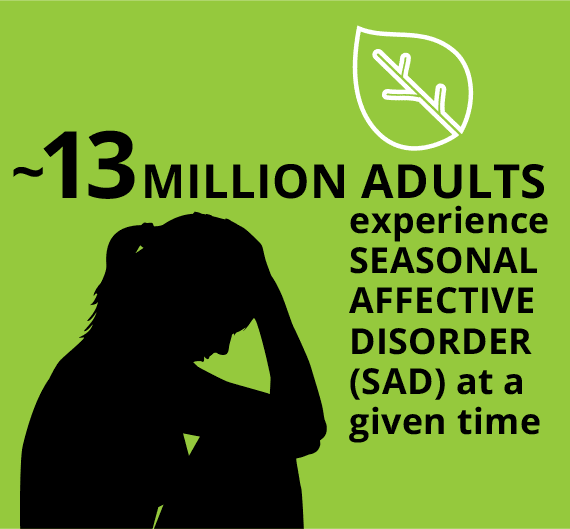
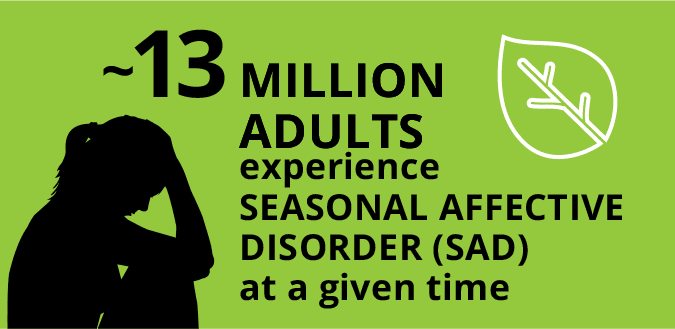
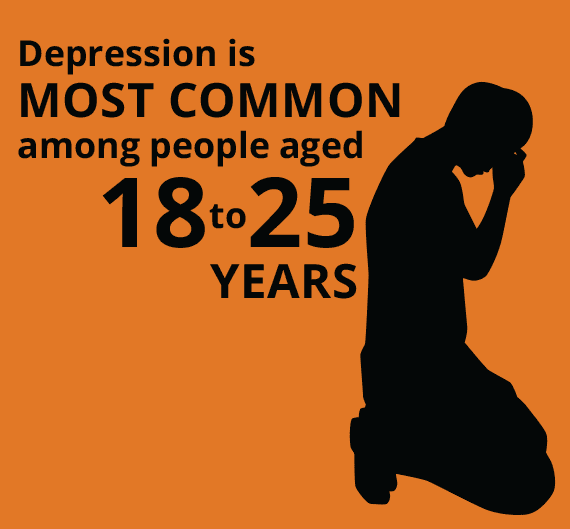
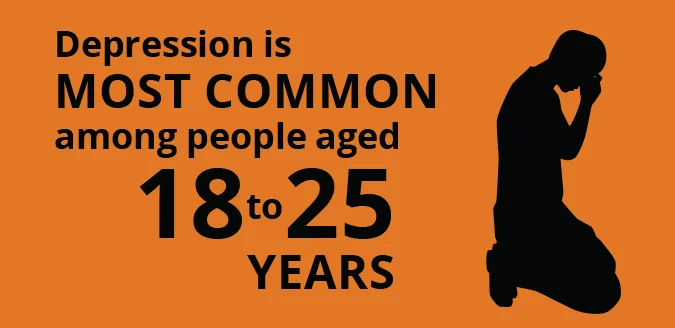
Seeking help from a healthcare professional is an important step in managing the symptoms of depression, which can cause many physical and mental health changes. Monitoring these changes and sharing them with a healthcare professional is an important step.
80% to 90% of people with depression who seek treatment eventually respond well to treatment
It can sometimes be tough to see through feelings of depression and manage other important areas of your life, but they need attention too. It's also important to remember that it is possible to maintain healthy relationships while managing a mental illness. Below are a few key relationships that may be especially difficult to keep up with and a few ways to approach them.
Remember that keeping up with your treatment plan is integral to helping you manage other areas of your life—whether that's medication, talk therapy, or other forms of treatment recommended by your healthcare professional.
Track symptom progress over time
View ResourceTalk to a healthcare professional
A diagnosis can only be made by a healthcare professional. Be sure to speak with a healthcare professional to determine how to appropriately manage your depression.
Learn about APLENZIN >>Creating a routine may seem overwhelming at first, but once you find your rhythm it can help you feel more in control. Use 1 or 2 of these tips to get started, and speak to your healthcare professional for treatment options and advice.
![]()
Talking to Family and Friends
About Your Depression

Go for a 10-minute walk to clear your mind
Close your eyes and refocus your breathing for 1 minute when feeling stressed

Plan a quick vacation to somewhere you find peaceful or enjoyable



Listen to music that makes you feel good—you can even make a trusty playlist for yourself
Find a calming activity like coloring, crocheting,
puzzles, etc

A fun getaway can be a great way to give yourself something to look forward to and get yourself out of a funk, but the planning process can seem more overwhelming than it's worth (especially if you're planning for multiple people). Here are a few ways to make your vacation goals a reality with a little less stress.
Set a budget to keep financial stress low. Staying within your budget will keep you focused on your trip and not add more worries to your plate
Choose a location you're excited about—that can mean a relaxing beach or a sightseeing adventure. Somewhere that brings you joy
Keep a list of potential expenses and costs, including flights, hotels, car rentals, meals
If you can, reach out to a travel planner to help—some are compensated by the destination/hotel and free for the traveler
If you like to have a plan before heading somewhere, create a flexible itinerary. Leaving room for spontaneity and last minute changes can help manage how you will react. Sometimes how we mentally prepare can be the difference between having a good time or having a great time
When it comes time to packing, give yourself time and don't rush. You may even want to make a list of items to bring or do an online search for suggested packing lists to help
Keep your end goal in sight and remember you'll be somewhere you enjoy soon!
Real Talk Insights on Managing Depression is specifically designed to provide helpful tips and tools to anyone who may be interested in learning more about managing depression.
General questions, including treatment options, are based on information provided by the National Institute of Mental Health.
To be diagnosed with major depressive disorder, an individual must have 5 clinical depression symptoms every day, nearly all day, for at least 2 weeks. One of the symptoms must be a depressed mood or a loss of interest or pleasure in almost all activities. It's important to talk to a healthcare professional. Primary care providers routinely diagnose and treat depression and refer individuals to mental health professionals, such as psychologists or psychiatrists.
No. Everyone is different; therefore, depression can affect people in different ways. That is why it’s important to discuss any and all symptoms with a healthcare professional.
Sometimes people go through short periods of time when seasons change where they feel sad or not like their usual selves. Some people may start to feel “down” when the days get shorter in the fall and winter (also called “winter blues”) and begin to feel better in the spring, with longer daylight hours.
In some cases, these mood changes are more serious and can affect how a person feels, thinks, and handles daily activities. If you have noticed significant changes in your mood and behavior whenever the seasons change, it is important to discuss this with a healthcare professional who can help determine if you are experiencing seasonal affective disorder.
You can view a list of SAD signs and symptoms here.
If you think you may be suffering from SAD, talk to a healthcare professional or a mental health specialist about your concerns. To diagnose you with SAD, a healthcare professional may have you fill out specific questionnaires along with other assessment tools to help determine if your symptoms are related to SAD.
Depression is a common mental health condition and can be treated in a variety of different ways with the help of a healthcare professional. Medication, talk therapy, or lifestyle changes such as increased exercise (or a combination of these) may help ease the symptoms of depression.
Antidepressants are prescription medications commonly used to treat depression. They take time to work—usually 4 to 8 weeks—before overall symptoms improve. It is important to give medication a chance before deciding whether or not it works.
The Substance Abuse and Mental Health Services Administration provides the Behavioral Health Treatment Services Locator, an online tool for finding mental health treatment and support groups in your area.
Treatments are available that can help many people with SAD. They fall into 4 main categories and may be used alone or in combination: light therapy, psychotherapy, antidepressant medications, and vitamin D. Talk to a healthcare professional about which treatment, or combination of treatments, is best for you.
People with a history of SAD may benefit from starting certain treatments before the fall season to help prevent or reduce depression. Bupropion is an antidepressant that has been shown to prevent SAD in clinical trials. Therefore, people with SAD should discuss with healthcare professionals if they want to initiate treatment early to prevent symptoms.
Speak with your insurance provider or a healthcare professional about any insurance, copay, or financial assistance questions you may have. If you are currently taking APLENZIN, you can click here to learn more.
You can learn more about whom APLENZIN can help by clicking here.
To learn more about MDD, one of the conditions APLENZIN is approved to treat, click here.
To learn more about SAD and how you may be able to prevent symptoms, click here.
See what makes APLENZIN different by clicking here.
Click here to learn how to take APLENZIN properly. Always take APLENZIN as prescribed by a healthcare professional.
To learn more about savings and access, click here.
Free, peer-support service of trained volunteers who can provide local referrals and come up with tangible next steps. Available Monday through Friday from 10 AM to 10 PM ET. Call 1-800-950-6264 or email helpline@nami.org.
Free, confidential support available 24/7 for individuals in stress and for their loved ones. Call 1-800-273-8255 (English) or 1-888-628-9454 (en español).
Free, confidential information and referral service offered 24/7 for individuals with mental health or substance abuse disorders and their loved ones. Call 1-800-662-4357.
APLENZIN® (bupropion hydrobromide extended-release tablets) is a prescription medicine used to treat adults with a certain type of depression called major depressive disorder, and for the prevention of autumn-winter seasonal depression (seasonal affective disorder).
WARNING: CHANGES IN THINKING AND BEHAVIOR, DEPRESSION, AND SUICIDAL THOUGHTS OR ACTIONS
Suicidal Thoughts or Actions and Antidepressant Drugs
Antidepressants may increase the risk of suicidal thoughts or actions in some children, teenagers, or young adults within the first few months of treatment. Depression or other serious mental illnesses are the most important causes of suicidal thoughts and actions. People who have (or have a family history of) bipolar illness or suicidal thoughts or actions may have a particularly high risk. Pay close attention to any changes, especially sudden changes in mood, behaviors, thoughts, or feelings. Call your healthcare provider right away if symptoms such as anxiety, irritability, impulsivity, trouble sleeping, aggressive behavior or suicidal thoughts are new, worse or worry you. APLENZIN has not been evaluated for use in patients under the age of 18.
APLENZIN® (bupropion hydrobromide extended-release tablets) is a prescription medicine used to treat adults with a certain type of depression called major depressive disorder, and for the prevention of autumn-winter seasonal depression (seasonal affective disorder).
WARNING: CHANGES IN THINKING AND BEHAVIOR, DEPRESSION, AND SUICIDAL THOUGHTS OR ACTIONS
Suicidal Thoughts or Actions and Antidepressant Drugs
Antidepressants may increase the risk of suicidal thoughts or actions in some children, teenagers, or young adults within the first few months of treatment. Depression or other serious mental illnesses are the most important causes of suicidal thoughts and actions. People who have (or have a family history of) bipolar illness or suicidal thoughts or actions may have a particularly high risk. Pay close attention to any changes, especially sudden changes in mood, behaviors, thoughts, or feelings. Call your healthcare provider right away if symptoms such as anxiety, irritability, impulsivity, trouble sleeping, aggressive behavior or suicidal thoughts are new, worse or worry you. APLENZIN has not been evaluated for use in patients under the age of 18.
Call your healthcare provider right away if you or your family member has any of the following symptoms, especially if they are new, worse, or worry you:
Although APLENZIN is not a treatment for quitting smoking, it contains the same active ingredient (bupropion) as ZYBAN, which is used to help patients quit smoking.
Some people have had serious side effects while taking bupropion to help them quit smoking, including:
New or worse mental health problems, such as changes in behavior or thinking, aggression, hostility, agitation, depression, or suicidal thoughts or actions. Some people had these symptoms when they began taking bupropion, and others developed them after several weeks of treatment, or after stopping bupropion. These symptoms happened more often in people who had a history of mental health problems before taking bupropion than in people without a history of mental health problems.
Stop taking APLENZIN and call your healthcare provider right away if you, your family, or caregiver notice any of these symptoms. Work with your healthcare provider to decide whether you should continue to take APLENZIN. In many people, these symptoms went away after stopping APLENZIN, but in some people, symptoms continued after stopping APLENZIN. It is important for you to follow-up with your healthcare provider until your symptoms go away.
Before taking APLENZIN, tell your healthcare provider if you have ever had depression or other mental health problems. You should also tell your healthcare provider about any symptoms you had during other times you tried to quit smoking, with or without bupropion.
What Other Important Information Should I Know About APLENZIN?
Do not take APLENZIN if you:
Although APLENZIN is not a treatment for quitting smoking, it contains the same active ingredient (bupropion) as ZYBAN, which is used to help patients quit smoking. Before taking APLENZIN, tell your healthcare provider if you have ever had depression, suicidal thoughts or actions, or other mental health problems or any symptoms you had during other times you tried to quit smoking with or without bupropion. Also, tell your healthcare provider about your other medical conditions, including if you:
Tell your healthcare provider about all the medicines you take, including prescription and over-the-counter medicines, vitamins, and herbal supplements. Many medicines increase your chances of having seizures or cause other serious side effects if you take them while you are using APLENZIN.
The most common side effects of APLENZIN include: trouble sleeping, stuffy nose, dry mouth, dizziness, feeling anxious, nausea, constipation, and joint aches.
Click here to read the Medication Guide carefully before you start using APLENZIN. If you have any questions about APLENZIN, ask your healthcare provider or pharmacist.
Click here for full Prescribing Information, including Medication Guide and Boxed Warning regarding suicidal thoughts and actions.
You are encouraged to report negative side effects of prescription drugs to the FDA. Visit www.fda.gov/medwatch or call 1-800-FDA-1088. You may also contact Bausch Health Customer Service at 1-800-321-4576.

